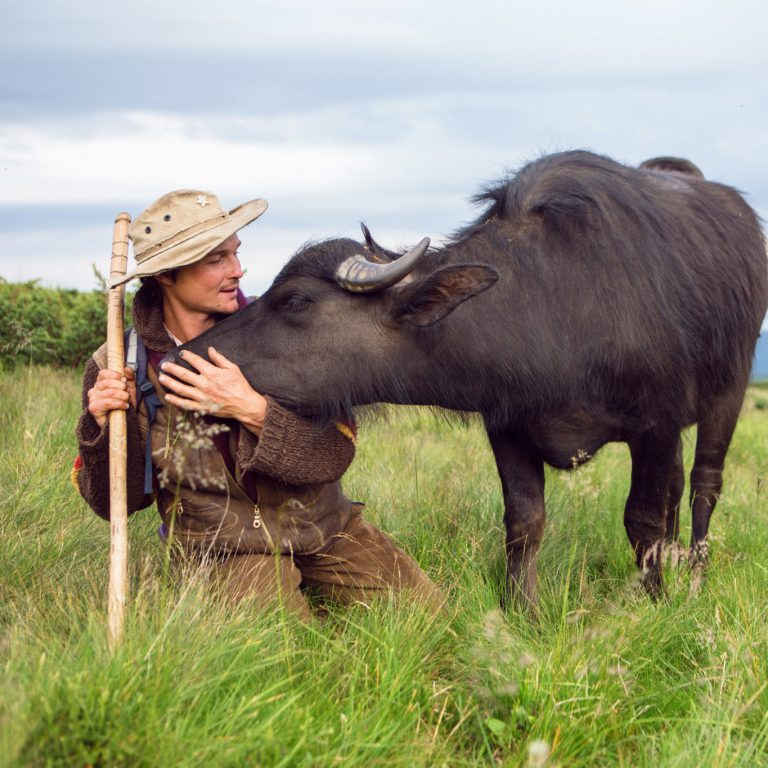— Who do you want to see? — asks an elderly man as he continues digging in his garden. — Michel… Michel Jacobi — the German fellow who breeds buffaloes here. Do you know him? — Who doesn’t?! Of course, we know him. It’s that way!
The entire Zakarpattia region knows Michel. We first met in winter at his stables in the village of Chumaliovo, where Michel had built a huge hangar for his animals and two tiny rooms for himself. He has two beds, a stove and an oven, where he prepares his meals. We sit down to talk about why he is here in Zakarpattia, and it seems that he really wants to tell us about this experience. Michel’s face shines in the dark, emitting some kind of incredible strength. He speaks with a true accent of Zakarpattia; sometimes we cannot understand the words, so he uses English. Michel learnt the local language from elderly people who also taught him how to breed cattle.
Michel is 33 years old. He comes from Kiel, a city in northern Germany, situated near the Danish border. His parents have their own business, and his brother recently opened a factory. Michel studied forestry and ecology in Freiburg — a city near France and Switzerland — but did not want to stay and work in his own country.
— I thought that I could find ecological conditions that our ancestors shared because they don’t exist in Germany anymore. People should live closer to nature; this is what I want to demonstrate through my experience.
Michel first joined the Longo Mai Cooperative and helped the village of Nyzhnie Selyshche. Then he became interested in buffaloes. He learnt that in the early twentieth century there had been several thousand buffaloes in the three surrounding villages. Each household kept buffaloes just as now they keep cows. But then the communists came and took all the buffaloes away to collective farms. People were left with nothing. Everything was collectivized. The exiled buffaloes refused to give milk and were slaughtered for meat by the collective farm leaders.

— You would come to her to get some milk and she would be telling you, “Hey, man, what do you want? What milk? Are you what, my kid or my friend? Why would you need milk?” These buffaloes at collective farms didn’t produce any milk, so communists slaughtered them for meat.
About a hundred buffaloes were left in the villages in the 1990s. Their population is constantly declining. Michel came here seven years ago and started looking for buffaloes in every house and village. He found some charity organizations that helped him in his search; several village leaders gave him land, which no one had claimed, and Michel began collecting buffaloes from the surrounding area.
This is Michel’s second farm; the first was in Steblivka. Michel says that Chumaliovo is much better as it is further away from people and there is almost no waste or garbage in the fields. In summer, Michel leads the buffaloes to Pereslip mountain valley in Rakhiv district. They walk over a week, stopping in different places for the night.
— When we slaughter a buffalo in the village, we find up to 10 kilos of plastic in his stomach. Our buffaloes get sick from all this garbage. People litter without thinking about nature or what it will do to the animals.
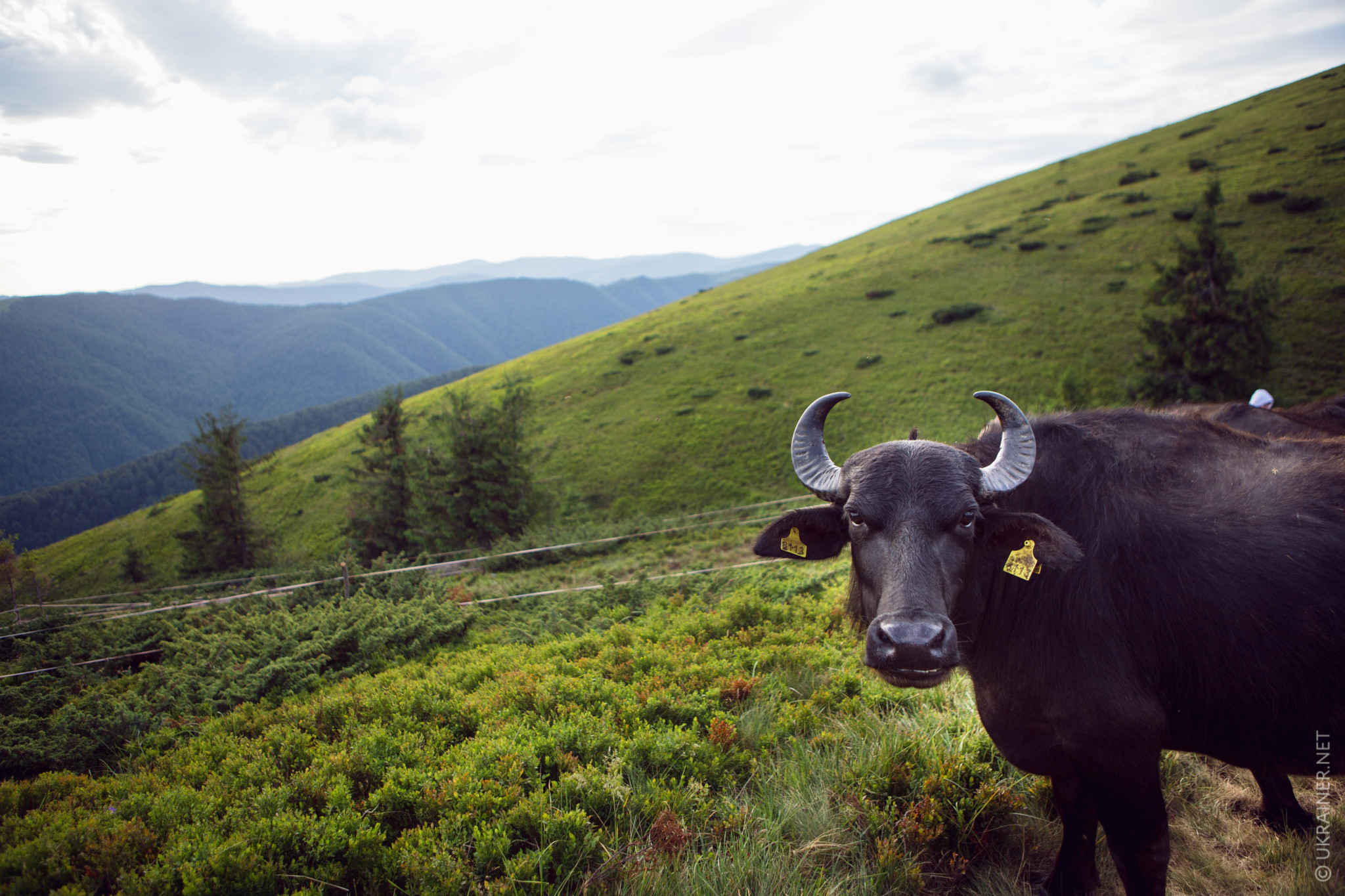
Breeding buffaloes is not a prosperous business. Only milk and cheese production enables Michel to keep his farm running. A kilo of cheese costs 200 UAH. Nobody wants to buy buffaloes.
— I can name any price. The average value of a buffalo is about two thousand euros. But, no one wants to buy… even for five hundred euros! Sometimes someone buys one animal and then slaughters it for meat after six months of hard work. People call me and say, “Man, take these stupid buffaloes back!” I haven’t sold a single one in the past two years. Everyone says Carpathian buffaloes are dumb, but that’s not true. On the contrary, they’re more like people. A buffalo is not made for business; it can help you on the farm, but no more. I have ten buffaloes on my farm, but only three produce milk. The others still don’t trust me!
— There are different kinds of buffaloes. Our Carpathian is very smart, and completely different from the Bulgarian, for example. The Carpathian buffalo is a friend. You mustn’t beat him. The Carpathian buffalo is the Ukrainian elephant. He remembers everything; he has his own personality. Buffaloes never produce milk if you aren’t friends. You have to talk to him… he’s not a stupid cow or goat!
Each buffalo has a name. The bull is called Romko. Michel addresses his animals in the dialect of Zakarpattia. We visit them in their pasture, he introduces us to them, talks about each buffalo, introduces us to the bull, advises us to stay clear of him. We have mixed feelings about these animals… some are cleaning their hoofs, others are breathing heavily. It looks as if they are getting ready for a bullfight. Michel offers to give us a ride on his friendliest buffalo. All four of us refuse politely…
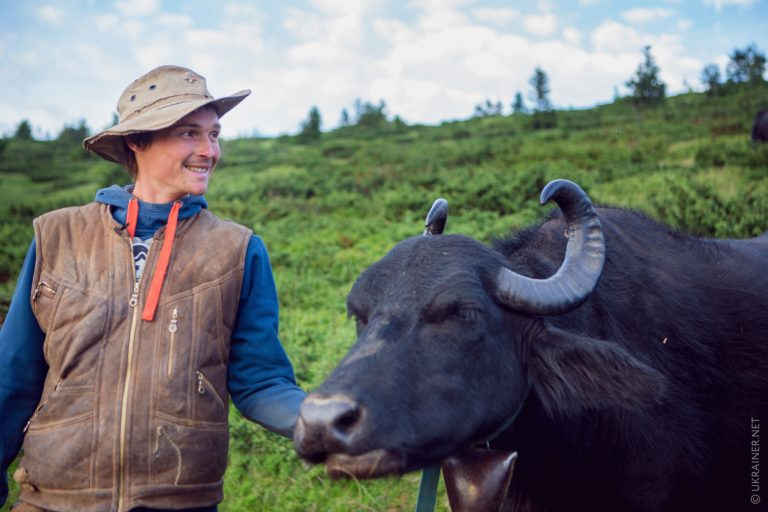
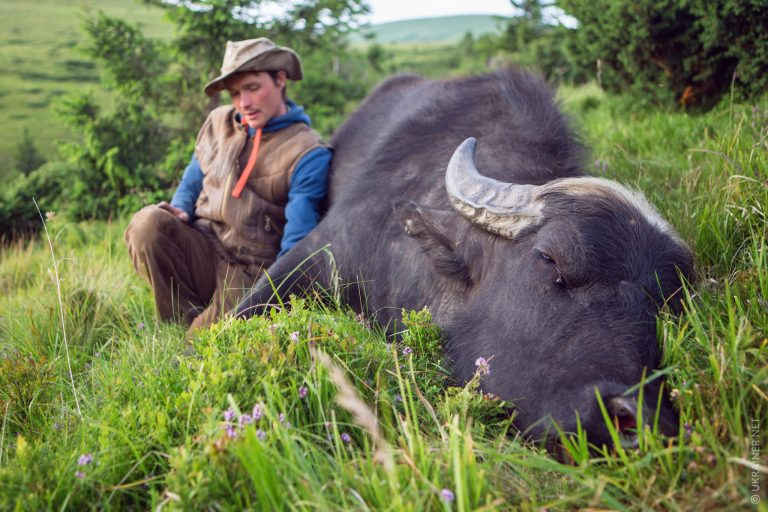
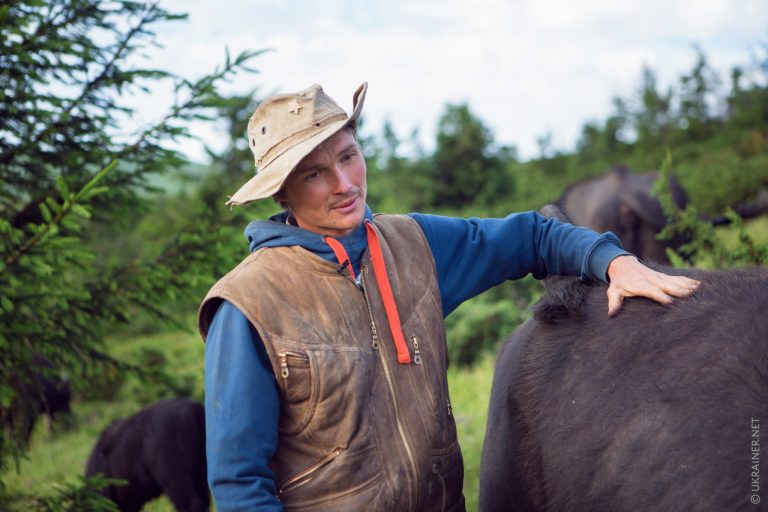
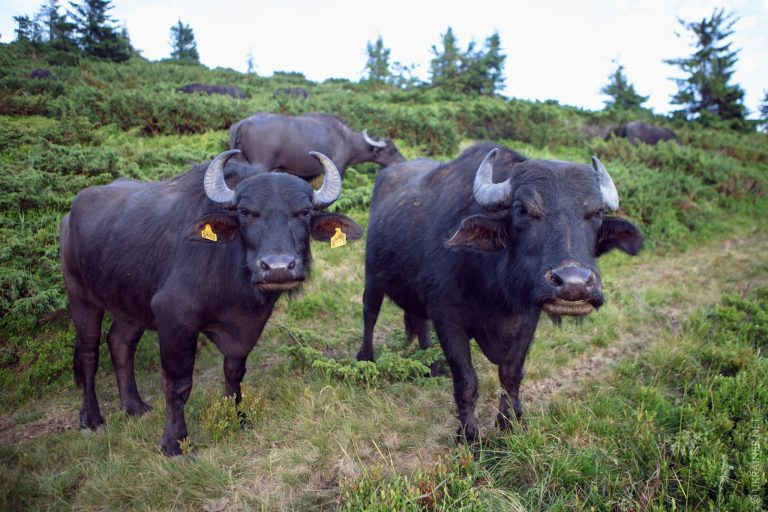
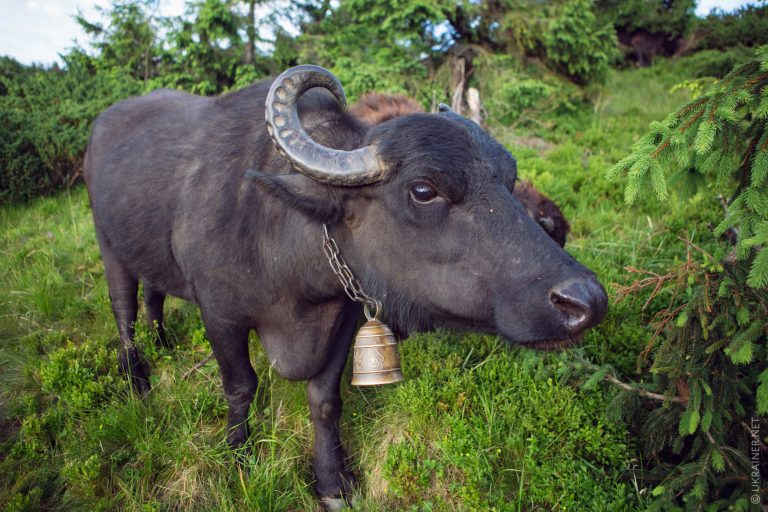
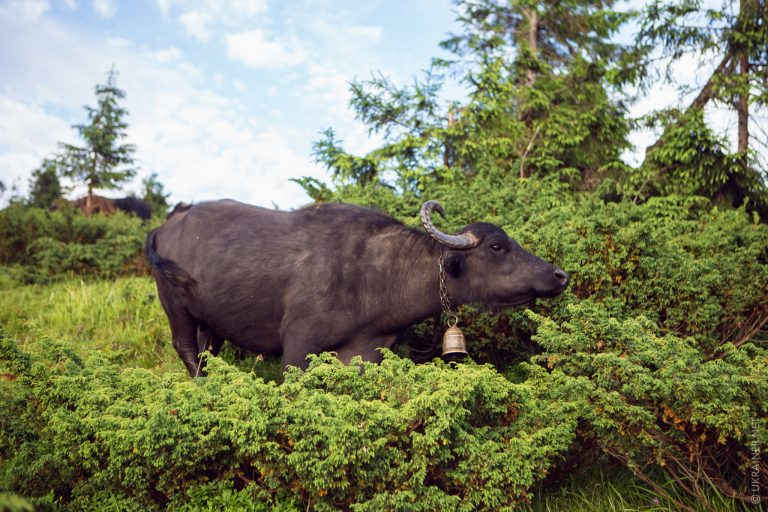
slideshow
Michel has a very reasonable approach to organizing his farm. He recently created a breed registry, a genetic pool in the centre of Zakarpattia — the Saldobosh buffalo farm — and a network of nurseries with five genetic lines. Michel is trying to demonstrate how to breed and raise buffaloes. Five years ago, when Michel started his farm, he often organized meetings with people who had previously raised buffaloes.
— I realized that no one knew what to do. Here I was, an ordinary German guy organizing workshops on how to care for animals that have lived here for thousands of years!
However, Michel knows an elderly lady whom he calls his teacher. She has taught him a lot about local plants, agriculture and livestock.
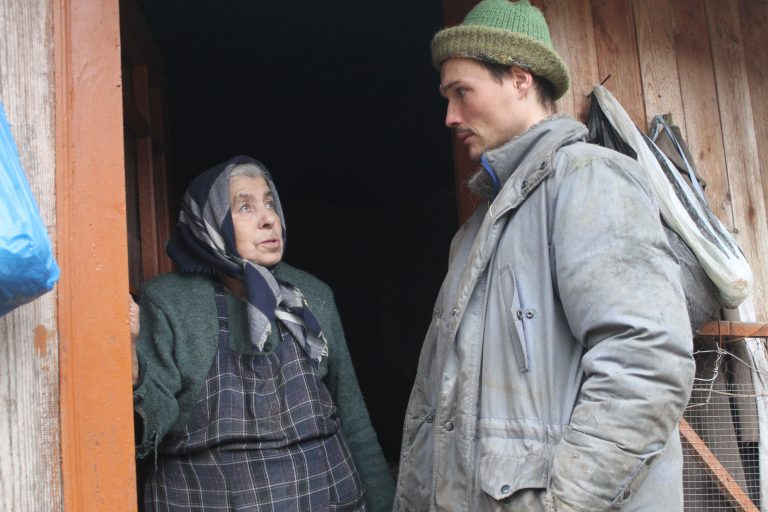
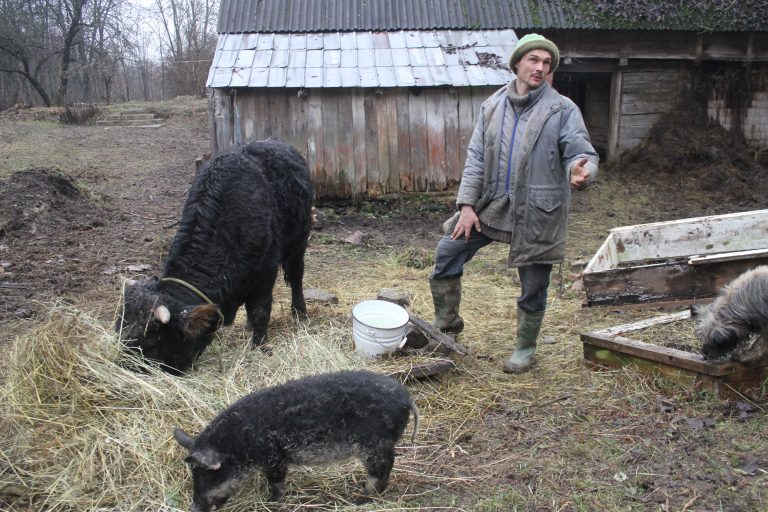
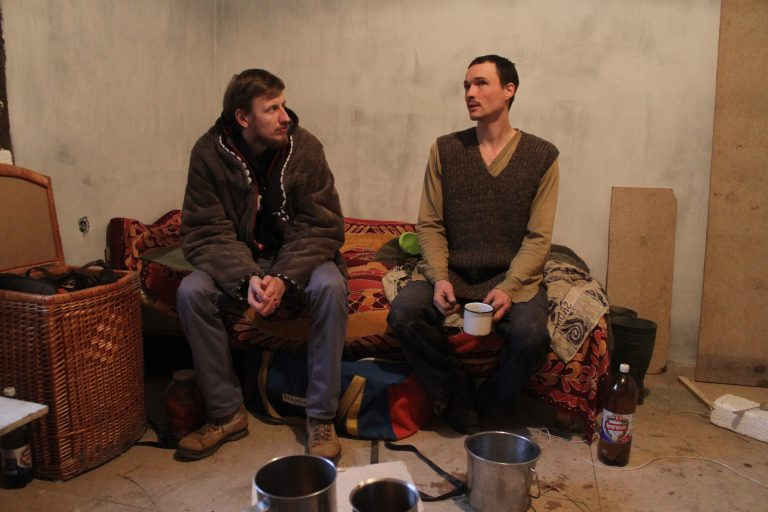
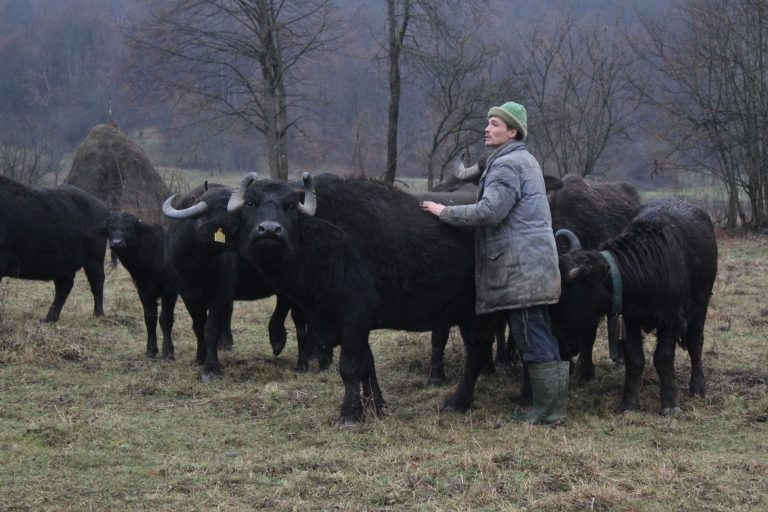
slideshow
Michel always welcomes volunteers, but says it is awfully hard to work with them… In fact, it is harder than with animals because animals tend to behave more predictably. Volunteers come for a short a time, start getting used to the process and hard work, and suddenly it is time to go back home. Some volunteers complain when Michel leaves the farm for a few days. He has another old farm in Chumaliovo — home to his goats. There he also has a Hutsul cow and a Carpathian woolly pig named Sasha that behaves like a dog.
Michel also breeds small horses, a local subspecies called Hutan. There are only about five hundred woolly pigs left in the area, and Michel has fifty. He also owns half of all the buffaloes in the Carpathians…. if not more.
The roads are very bad here. After a rainfall, huge chunks of clay stick to your shoes, but Michel does not mind. He says it keeps people and tourists away. The only half-decent road leads to the monastery and the garbage that appears in the pasture lands comes from there.
Michel is constantly looking for people who would like to join his venture. He has lived here without a shower and decent facilities for five years. But now he says he wants to make it better because his parents, who have important business in Germany, visit him every year, and it is very difficult for them to get used to the mud and such primitive conditions.
Michel has many plans and projects for the future. So, here is this German, who has no Ukrainian roots, living in this desolate place, learning the local language, learning how to breed native animals and how to build up a small business in our post-Soviet system of restrictions and prohibitions. Michel is still surprised by the indifference and apathy of the locals, but he believes that things will get better.
— Of course, I understand what’s happened in this country. The communists came and cleaned out everything. Anyone who was able to work or think was taken away, and only those who obeyed orders were left. So, I go to the village and say, “Take your tools and get to work!” And what do I hear in return? “We can’t”. They always seem to be missing something or they don’t have time to work. I show them that there are great opportunities here for everyone. I’ve chosen this life; I live here with my buffaloes near an open fire like their grandparents and great-grandparents used to do. Some people think I work here for some sort of foundation, and they also expect someone to come and do everything for them… someone else, but not them themselves.
Michel has a soft and pleasant voice. While he talks, his eyes shine with amazing light, and his words are full of enthusiasm and incredible energy. Michel treats us with milk and cheese. The buffalo milk is unusually rich and the cheese has a truly amazing taste.
— People sell bryndza for 100 UAH a kilo. It should be much much more! This cheese is an organic food product from the heart of the Carpathians. It’s pure and very tasty.
Bryndza
Bryndza cheese is creamy white in appearance, known for its characteristic strong smell and taste.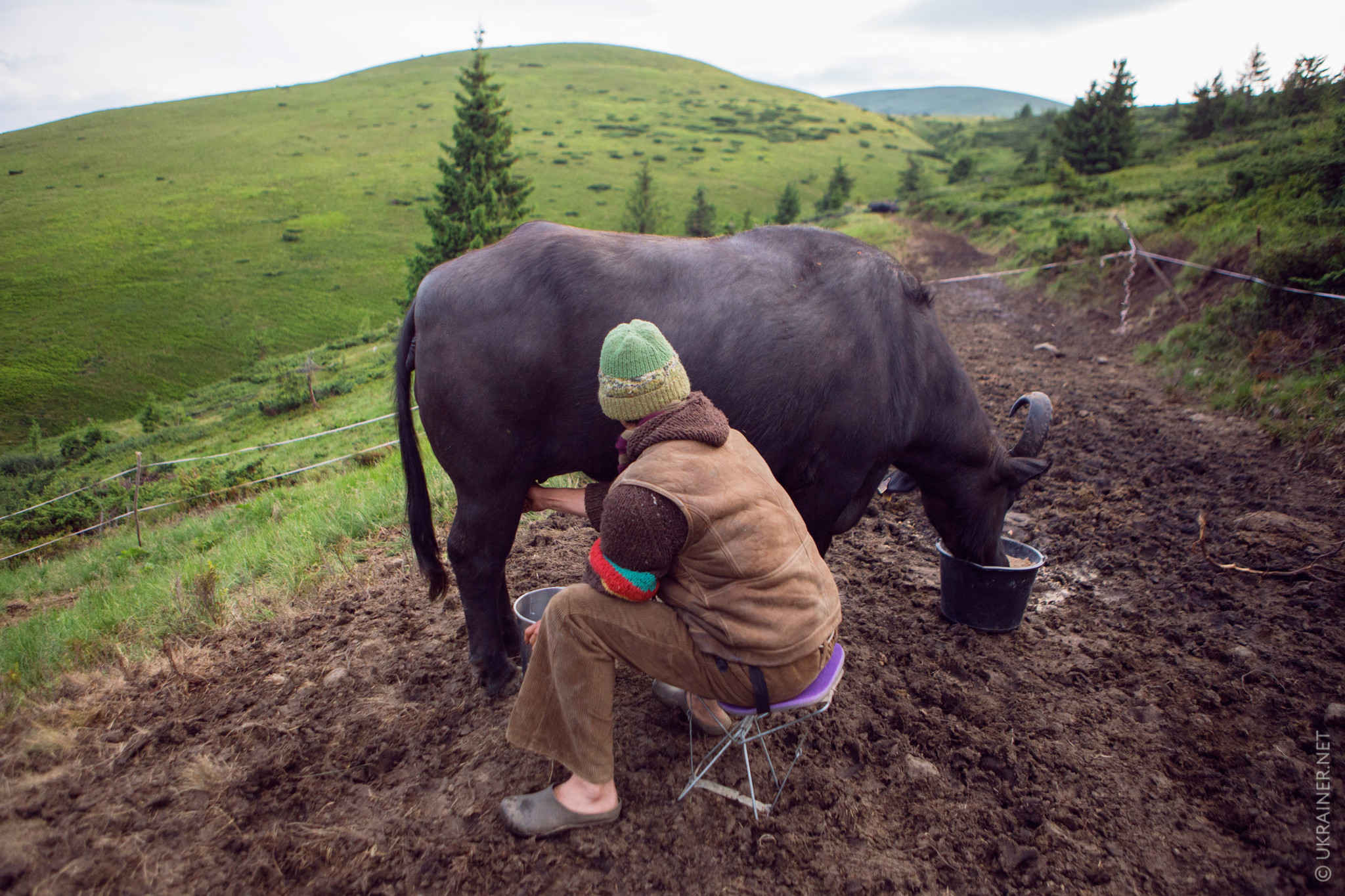
This summer, Michel left the pasture lands of plastic and garbage that buffaloes like to eat and took his animals to the Pereslip mountain valley in Rakhiv district. The area used to be inhabited by shepherds who spent their summers there with their flocks, but now the meadows and pasture lands are completely empty. There is no mobile reception here. Michel lives here for some months of the year. He has built himself a tiny wooden cabin. No need for stables… his buffaloes graze and sleep out in the open.
For more detailed information about the farm, or how to sign up as a volunteer or just pay a visit, please go to Saving Agrobiodiversity in Transkarpathia.
Spread the word about Michel Jacobi and his great mission! Don’t let Michel be the last friend of our buffaloes in the Ukrainian Carpathian Mountains.

